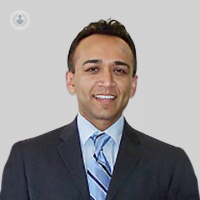Testosterone deficiency in men: an explanation
Written in association with:Testosterone plays a crucial role in the development and maintenance of male reproductive tissues and is also important for overall health and well-being. Respected consultant endocrinologist Dr Masud Haq explains more about testosterone deficiency, including the symptoms, potential causes and treatment options.

What are the symptoms of low testosterone in men, and how is it diagnosed?
Testosterone deficiency (TD) is a condition which commonly causes erectile dysfunction and low sexual desire.
However, patients can develop the following symptoms:
- Fatigue.
- Exhaustion.
- Poor concentration.
- Depression.
- Loss of muscle strength.
- Weight gain.
- Hair loss.
- Hot flushes.
- Sleep disturbance.
If left untreated, testosterone deficiency can result in long-term complications such as osteoporosis, insulin resistance, risk of developing type 2 diabetes and reduced life expectancy.
It is diagnosed on a combination of symptoms and low testosterone levels.
What are the potential causes of testosterone deficiency, and can it be prevented?
TD is an extremely prevalent condition, affecting up to 1 in 10 adult men. It is more common with age, and in men with obesity and type 2 diabetes.
TD can be primary, secondary or functional in origin. Surgery or previous infections such as mumps orchitis can result in primary TD. Secondary TD is due to hypothalamic or pituitary conditions such as cysts or swellings (adenomas) of the pituitary, previous surgery or inflammatory conditions.Functional TD can be due to obesity or ageing.
Testosterone levels naturally decline with age. However, these levels can be preserved through leading a healthy lifestyle and regular exercise.
What treatment options are available for men with low testosterone levels?
Patients with suspected TD should seek specialist advice so that individuals can be carefully assessed, and have relevant blood tests and scans to verify the diagnosis. Upon confirmation of TD, it is crucial to address the underlying cause. Additionally, patients may be offered the option of transdermal testosterone gels or injections.
Are there any natural ways to boost testosterone levels, such as through diet or exercise?
Yes, testosterone can be improved through a healthy balanced diet, weight loss, regular exercise, improving sleep, and reducing alcohol intake.
What are the potential risks and benefits of testosterone replacement therapy for men?
The main benefits include an enhanced quality of life marked by reduced fatigue, improved mood, enhanced erectile function and libido, as well as better bone and muscle health.
Treatment is generally well received. Pain at injection sites and skin reactions with gels are relatively uncommon. Although there is a potential risk of changes in mood and an increase in blood counts (haematocrit), this risk is less common.
If you would like to book a consultation with Mr Haq, do not hesitate to do so by visiting his Top Doctors profile today.


